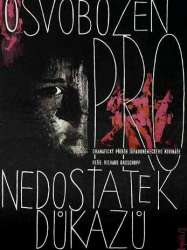Peter Sturm is a Actor born on 24 august 1909 at Austria-Hungary
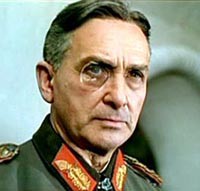
Josef Michel Dischel (24 August 1909 – 11 May 1984), known by his adopted stage name Peter Sturm, was an Austrian and an East German actor.
Dischel was born into a religious Jewish family in Vienna. His father was a tailor, originally from the Polish regions of the Habsburg Empire, and died in 1915. His mother was born in Hungary.
Dischel had taken up an apprenticeship as a textile merchant, but abandoned it. He then decided to become an actor, and began taking drama lessons from renowned Austrian performer Raoul Aslan. While studying, he worked as a radio mechanic. After completing his studies, he assumed the stage name Peter Sturm. He joined the Social Democratic Party of Austria when he was nineteen years old, and later turned to an active member of the Communist Party of Austria, that was declared illegal by Chancellor Engelbert Dollfuss. In 1935, he was convicted of high treason and condemned to two and a half years in prison. Sturm eventually served eighteen months, in the Stein an der Donau prison and in the Wöllersdorf detention camp. In 1936, subsequent to his release, he joined the cast of Brettl am Alsergrund, a political, left-leaning kabarett in Vienna's Alsergrund district, that was managed by Leon Askin and commonly known as Das ABC Kabarett. The actor was one of the cabaret's three declared communists, alongside Jura Soyfer and Robert Klein-Lörk.
Holocaust
In May 1938, after the Anschluss, Sturm was arrested and sent to the Dachau concentration camp. In August, he was transferred to the Buchenwald concentration camp, where he was held in the same barrack with actor Fritz Grünbaum. He was registered as an Austrian political prisoner. In April 1939, Sturm was released from Buchenwald and allowed to leave Germany. He emigrated to Italy, spending three months in Milan. Then, he illegally crossed the border into France, settling in Marseilles. After the Second World War broke out in September, he was interned in the Camp des Milles, where he acted in the camp's makeshift theater. On 27 June 1941, shortly after France surrendered to Germany, the camp's residents were to be evacuated on a train to Bayonne. Sturm managed to escape. He lived in Marseilles until August 1942, when he was deported to the Drancy internment camp, from which he was sent to the Auschwitz concentration camp. He was held in the Blechhammer sub-camp, where he was forced to serve as a barber. Occasionally, when the guards authorized it, he participated in theater evenings. In January 1945, the prisoners were evacuated to Buchenwald in a death march. Sturm survived it and wrote an account on the march shortly after arriving in Buchenwald. He joined the camp's communist underground organization. While in Buchenwald, he was a member of the building detachment headed by Robert Siewert. During the Holocaust, his mother was murdered in Auschwitz. Buchenwald was liberated on 11 April 1945.
Later years
Sturm returned to Vienna, where he resumed his acting career and worked as a radio presenter. He appeared regularly on the stage of the Theater in der Josefstadt, and later joined the cast of the New Theater in the Scala in the city's Wieden district, then in the Soviet-administrated zone. The theater, opened in 1948, was founded by communist exiles who returned to Austria after the end of the war. Sturm made his debut on screen in the 1956 film adaptation of the operetta Gasparone. During the same year - after the Soviet withdrawal from Austria left it without financial and political support - the Scala had to be closed. With several other fellow actors from the theater, Sturm left Vienna and emigrated to the German Democratic Republic, settling in East Berlin. There, director Wolfgang Langhoff took him into the Deutsches Theater, in which he remained a member of the regular cast. In 1960, he performed the role of August Rose, a Buchenwald prisoner who betrays his friends, in a television production based on Bruno Apitz's novel Naked Among Wolves. On 30 March 1961 Sturm was awarded the Art Prize of the German Democratic Republic. In 1963, when he was requested to play August Rose once more for Frank Beyer's film remake of the series, Apitz and Beyer had to convince him to agree. Sturm was badly depressed by the work on Naked Among Wolves, and became very ill after the filming ended. He was involved in the commemoration of Buchenwald's victims until his departure.
Sturm had a long career as an actor with DEFA and DFF in East Germany, appearing in more than fifty cinema and television productions.
Source : Wikidata
Peter Sturm

- Infos
- Photos
- Best films
- Family
- Characters
- Awards
Birth name Josef Michel Dischel
Birth 24 august 1909 at Austria-Hungary
Death 11 may 1984 (at 74 years)
Birth 24 august 1909 at Austria-Hungary
Death 11 may 1984 (at 74 years)
Biography
Early lifeDischel was born into a religious Jewish family in Vienna. His father was a tailor, originally from the Polish regions of the Habsburg Empire, and died in 1915. His mother was born in Hungary.
Dischel had taken up an apprenticeship as a textile merchant, but abandoned it. He then decided to become an actor, and began taking drama lessons from renowned Austrian performer Raoul Aslan. While studying, he worked as a radio mechanic. After completing his studies, he assumed the stage name Peter Sturm. He joined the Social Democratic Party of Austria when he was nineteen years old, and later turned to an active member of the Communist Party of Austria, that was declared illegal by Chancellor Engelbert Dollfuss. In 1935, he was convicted of high treason and condemned to two and a half years in prison. Sturm eventually served eighteen months, in the Stein an der Donau prison and in the Wöllersdorf detention camp. In 1936, subsequent to his release, he joined the cast of Brettl am Alsergrund, a political, left-leaning kabarett in Vienna's Alsergrund district, that was managed by Leon Askin and commonly known as Das ABC Kabarett. The actor was one of the cabaret's three declared communists, alongside Jura Soyfer and Robert Klein-Lörk.
Holocaust
In May 1938, after the Anschluss, Sturm was arrested and sent to the Dachau concentration camp. In August, he was transferred to the Buchenwald concentration camp, where he was held in the same barrack with actor Fritz Grünbaum. He was registered as an Austrian political prisoner. In April 1939, Sturm was released from Buchenwald and allowed to leave Germany. He emigrated to Italy, spending three months in Milan. Then, he illegally crossed the border into France, settling in Marseilles. After the Second World War broke out in September, he was interned in the Camp des Milles, where he acted in the camp's makeshift theater. On 27 June 1941, shortly after France surrendered to Germany, the camp's residents were to be evacuated on a train to Bayonne. Sturm managed to escape. He lived in Marseilles until August 1942, when he was deported to the Drancy internment camp, from which he was sent to the Auschwitz concentration camp. He was held in the Blechhammer sub-camp, where he was forced to serve as a barber. Occasionally, when the guards authorized it, he participated in theater evenings. In January 1945, the prisoners were evacuated to Buchenwald in a death march. Sturm survived it and wrote an account on the march shortly after arriving in Buchenwald. He joined the camp's communist underground organization. While in Buchenwald, he was a member of the building detachment headed by Robert Siewert. During the Holocaust, his mother was murdered in Auschwitz. Buchenwald was liberated on 11 April 1945.
Later years
Sturm returned to Vienna, where he resumed his acting career and worked as a radio presenter. He appeared regularly on the stage of the Theater in der Josefstadt, and later joined the cast of the New Theater in the Scala in the city's Wieden district, then in the Soviet-administrated zone. The theater, opened in 1948, was founded by communist exiles who returned to Austria after the end of the war. Sturm made his debut on screen in the 1956 film adaptation of the operetta Gasparone. During the same year - after the Soviet withdrawal from Austria left it without financial and political support - the Scala had to be closed. With several other fellow actors from the theater, Sturm left Vienna and emigrated to the German Democratic Republic, settling in East Berlin. There, director Wolfgang Langhoff took him into the Deutsches Theater, in which he remained a member of the regular cast. In 1960, he performed the role of August Rose, a Buchenwald prisoner who betrays his friends, in a television production based on Bruno Apitz's novel Naked Among Wolves. On 30 March 1961 Sturm was awarded the Art Prize of the German Democratic Republic. In 1963, when he was requested to play August Rose once more for Frank Beyer's film remake of the series, Apitz and Beyer had to convince him to agree. Sturm was badly depressed by the work on Naked Among Wolves, and became very ill after the filming ended. He was involved in the commemoration of Buchenwald's victims until his departure.
Sturm had a long career as an actor with DEFA and DFF in East Germany, appearing in more than fifty cinema and television productions.
Usually with
Filmography of Peter Sturm (16 films)
Actor
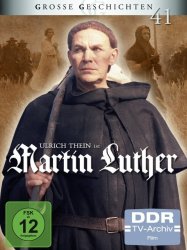
Martin Luther (1983)
, 7h30Genres Drama, Biography, Historical
Actors Ulrich Thein, Renate Blume, Hannjo Hasse, Jürgen Frohriep, Peter Sturm
Rating73%





Première partie Der Protest (La Protestation)

Jacob the Liar (1975)
, 1h36Directed by Frank Beyer
Origin Tchecoslovaquie
Genres Drama, War, Comedy, Comedy-drama, Historical
Themes Films about religion, Political films, Films about Jews and Judaism
Actors Vlastimil Brodský, Erwin Geschonneck, Henry Hübchen, Blanche Kommerell, Peter Sturm, Dezső Garas
Roles Leonard Schmidt
Rating70%





In a Jewish ghetto in German-occupied Poland, a man named Jakob is summoned to the Gestapo office on a charge he broke the curfew. As the soldier who sent him there merely played a prank on him, he is released, but not before hearing a radio broadcast about the defeats of the German Army. As no one believes he went to the Gestapo and came out alive, Jakob makes up another tale, claiming he owns a radio – a crime punishable by death. He then starts encouraging his friends with false reports about the advance of the Red Army toward their ghetto. The residents, who are desperate and starved, find new hope in Jakob's stories. But it all ends as the Germans deport the people to their death in the extermination camps.
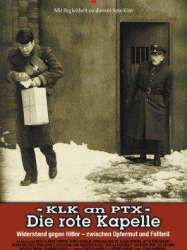 , 1h41
, 1h41Directed by Horst E. Brandt
Genres Drama, Historical
Themes Spy films, Political films
Actors Jutta Wachowiak, Karin Lesch, Siegfried Weiss, Günther Simon, Peter Sturm, Rudolf Ulrich
Roles Krapotschkin
Rating73%





After Hitler's rise to power in 1933, a group of regime opponents from various backgrounds consolidated under the leadership of Harro Schulze-Boysen and Arvid Harnack. They gather intelligence and pass it on to other countries. After the outbreak of the Second World War, and especially after the German invasion of the Soviet Union, they intensify their work. In August 1942, the Gestapo arrests Boysen and soon after cracks down on the spy ring.
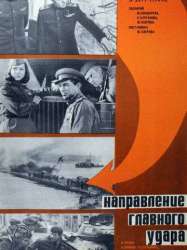
Liberation (film series) (1969)
, 1h10Directed by Youri Ozerov
Genres Drama, War, Romance
Themes Politique, Political films
Actors Nikolay Olyalin, Larisa Golubkina, Boris Seidenberg, Vsevolod Sanaïev, Vasily Shukshin, Fritz Diez
Roles Walter Model.
Rating76%





After the Soviets are alerted to the imminent German offensive in Kursk, they launch a preemptive artillery strike, delaying the enemy. The battalion of Lieutenant Colonel Lukin – led by officers Tzvetaev, Orlov, and Maximov – participates in the battle, as well as the tank of Lieutenant Vasiliev.

Directed by Werner W. Wallroth
Genres Comedy, Historical, Romance
Themes Political films, Napoleonic Wars films, French Revolution films
Actors Manfred Krug, Rolf Herricht, Peter Sturm, Carmen-Maja Antoni, Eberhard Cohrs, Karl-Ernst Sasse
Roles police chief (voice)
Rating61%





 , 1h54
, 1h54Directed by Günter Reisch
Genres Drama, Biography, Historical
Themes Politique, Political films
Actors Mikhaïl Oulianov, Albert Hetterle, Jutta Hoffmann, Erika Dunkelmann, Zofia Mrozowska, Siegfried Weiss
Rating72%





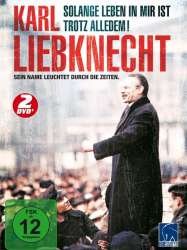 , 1h54
, 1h54Directed by Günter Reisch
Genres Drama
Themes Political films
Actors Albert Hetterle, Erika Dunkelmann, Siegfried Weiss, Hans Finohr, Adolf Fischer, Werner Dissel
Rating72%





The film opens in Berlin in 1914, as Germany is preparing for World War I. Liebknecht (Schulze) receives a call from a fellow lawyer and revolutionary, Mr. Rauch, that documents have been found proving the German heavy arms industry's secret involvement in the buildup to the war. He brings these documents to a meeting of the Reichstag, accusing Gustav Krupp and his company of bribing officials to release military secrets. In addition to this, Krupp and his company wrote to ask the French media to state that the French military has twice as much artillery as they actually possess so that they may provoke a surge in militarism. Afterward, while celebrating a friend's wedding, Liebknecht learns of the assassination of Archduke Franz Ferdinand, recognizing that this is the war the German imperialists were seeking. However, the resources for war still need to be approved. Liebknecht immediately begins campaigning among the public, denouncing the war as a means to secure profit for the capitalists. In an SPD party meeting, Liebknecht is one of only fourteen members to vote against the war credits. In the subsequent Reichstag meeting, he votes with the party discipline in favor of the war credits, to the public's surprise. He announces in the party meetings that he will no longer yield to party discipline and will stand by his anti-militarist principles even if the party leadership will not do the same. Liebknecht is the only one of the Reichstag — including 111 SPD representatives — to vote against the war loans, resulting in a number of death threats and work bans. Despite his immunity as a Reichstag member, Liebknecht is called to serve on the front as a sapper. It is here that he writes his 1915 manifesto, "The main enemy is at home!" The manifesto is passed among his fellow soldiers on the front before returning home. While he is away, Paul Schreiner, whose wedding Liebknecht attended earlier in the film, dies on the front. This leaves his wife Käthe to raise their newborn child alone and make Liebknecht's manifesto public.

The Heyde-Sawade Affair (1963)
, 1h41Actors Peter Sturm
After being responsible for the murder in round about 100.000 so called "euthanasia" cases in Nazi Germany till 1945, SS psychiatrist and physician Dr. Werner Heyde has lived uncovered under the pseudonym "Fritz Sawade" after the war in Northern Germany's Schleswig-Holstein. His true identity remains unclear over fourteen years occupied with medical expertises for the post-war Western Germany's justice. His wife had declared her husband as dead and received for this time a pension for a widow of a psychology professor. After being captured by the justice, Dr. Heyde found dead in his jail right before beginning of his trial.

Naked Among Wolves (1963)
, 1h56Directed by Frank Beyer
Genres Drama, War
Themes Politique, Films about religion, Political films, Films about Jews and Judaism
Actors Erwin Geschonneck, Armin Mueller-Stahl, Viktor Avdyushko, Peter Sturm, Zygmunt Malanowicz, Werner Dissel
Roles Rose
Rating71%





Buchenwald concentration camp, early 1945. A Polish prisoner named Jankowski, who has been on a death march from Auschwitz, brings a suitcase to the camp. When the inmates in the storage building open it, they discover a three-year-old child. Jankowski tells them he is the son of a couple from the Warsaw Ghetto, both of whom perished. Prisoner Kropinski becomes attached to the boy, and begs Kapo André Höfel to save him. Höfel, who is a member of the camp's secret communist underground, consults with senior member Bochow. He is instructed to send the child on the next transport to Sachsenhausen. Höfel cannot bring himself to do so, and hides him. Jankowski is deported to Sachsenhausen alone.
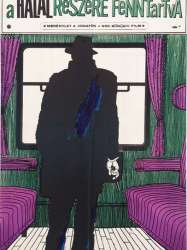
Reserved for the Death (1963)
, 1h25Directed by Heinz Thiel
Genres Drama, Thriller, Crime
Themes Spy films, Political films
Actors Hannjo Hasse, Peter Sturm
Roles Zugschaffner
Rating62%





Former East German engineer Erich Becker had been lured to West Germany by promises of a high reward. Now residing in Stockholm, he is recalled to serve as a spy in the East. He is to convince Dr. Jadenburg to flee from the GDR with the help of his daughter Hanna, who works for the West. While travelling on the train with Hanna, he is told that he is also to murder another agent who betrayed and now works for the Stasi. The traitor is revealed to be a former friend of Becker, Harry Korb. Becker cannot bring himself to kill Korb when they meet. Korb tells him that it was all a test to prove if he is reliable; since Becker failed, Korb murders him. The Stasi agents capture Korb soon after.
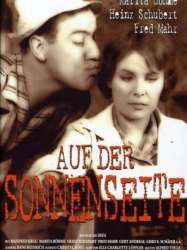
On the Sunny Side (1962)
, 1h41Directed by Ralf Kirsten
Genres Comedy, Musical, Romance
Themes Musical films
Actors Manfred Krug, Rolf Herricht, Peter Sturm, Rolf Römer, Carola Braunbock, Karl-Ernst Sasse
Roles Pabst
Rating62%





Martin Hoff, a steel smelter and an amateur actor and Jazz singer, is sent to a drama school by his factory's committee. Due to his troublesome conduct, he is expelled. Hoff meets a young woman called Ottilie who is unimpressed by him; he bets with his friends that he shall manage to charm her. Hoff begins to work in the construction site where she serves as a group manager, although she has troubles enforcing her will on her male subordinates. He only has success with her after director Jens Krüger guides him to become a diligent laborer. In addition to his work, he continues to perform in amateur plays. When theater manager Pabst sees him acting, he invites him to join his cast. Hoff and Ottilie decide to marry.
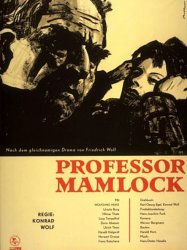
Professor Mamlock (1961)
, 1h40Directed by Konrad Wolf
Genres Drama
Themes Films about religion, Political films, Films about Jews and Judaism
Actors Wolfgang Heinz, Hilmar Thate, Peter Sturm, Ulrich Thein, Manfred Krug, Kurt Jung-Alsen
Roles Dr. Hirsch
Rating69%





Professor Mamlock, a respected Jewish surgeon, is certain that the Weimar Republic would survive the political crisis of the early 1930s. He disapproves of his son, Rolf, a communist activist who openly opposes the Nazis. When Hitler rises to power, Mamlock loses his work and his dignity. Realizing the mistake he made by being politically apathetic, Mamlock commits suicide. The film ends with his dead face blending away from the screen, on which appears the inscription: "there is no greater crime than not wanting to fight when fight one must."
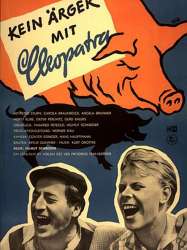
Kein Ärger mit Cleopatra (1960)
, 1h23Genres Drama
Themes Films about animals, Films about pigs
Actors Maly Delschaft, Peter Sturm, Carola Braunbock, Günther Simon, Sabine Thalbach
Roles Mathias Kahlow
The farm of the Kahlow family is struck by disaster: although it mated with neighbor Grossig's white swine, their white sow delivered black piglets, a sinister omen. The old Grandmother Kahlow interprets this as a sign from heaven not to join the nearby Agricultural Cooperative, although her grandson Claus - who wants to marry Grossig's daughter, Irma - wishes them to do so. Grossig supports her, and declares the piglets to be "unchristian", although the village priest resents that. But then, Father Melcior is also afflicted by the phenomenon: his sow, Cleopatra, delivers black piglets. He decides that the Old Kahlow is correct, and plans to start his own, Christian Cooperative, "with white pigs only". The villagers are very much upset. Wild rumors, fanned by superstition, take hold among them. In the Cooperative, the young animal breeder Inge discovers that Lubanski, the pig herder, secretly trained his black hog Brutus to sneak through fences, so he could mate with the farmers' sows. Lubanski, who greatly enjoyed the pandemonium, agrees to reveal the truth to the farmers. They all agree to join the Collective.
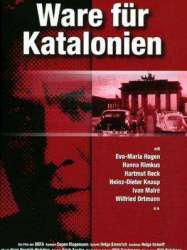
Goods for Catalonia (1959)
, 1h39Genres Drama, Crime
Actors Peter Sturm, Manfred Krug, Fritz Diez, Werner Dissel, Carola Braunbock, Margot Ebert
Roles Mr. Dupont
Rating66%





At 1959, the People's Police notices a strange occurrence: the local demand for optical instruments increases, while the orders from abroad sharply decrease. Several detectives launch an investigation, revealing that a West German criminal named Hasso Teschendorf has been forging documents and using them to illegally obtain the goods, which he sold to the Spanish Army and to customers in Barcelona. After a long hunt, the smuggler is arrested just before he manages to flee to West Berlin.
 Connection
Connection



